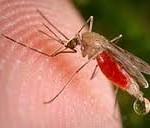Scientists are closing in to change the DNA of wild mosquitoes in order to eradicate malaria.
In the laboratory, they made a gene spread from a handful of mosquitoes to most of the population in just a few generations, according to a report in Nature.
If the right gene can be made to spread then researchers hope to reduce the number of cases of malaria. Academics have described the study as a “major step forward”.
Research groups have already created “malaria-resistant mosquitoes” using techniques such as introducing genes to disrupt the malaria parasite’s development.
The research, however, has a great challenge – getting those genes to spread from the genetically-modified mosquitoes to the vast number of wild insects across the globe.
Professor Andrea Crisanti, from the department of life sciences at Imperial College London, believes it could be possible to introduce genes which will make the mosquito target animals rather than humans, stop the parasite from multiplying in the insect or produce all male offspring which do not transmit malaria.
Professor Janet Hemingway, from the Liverpool School of Tropical Medicine, said the work was an “exciting breakthrough”.
She cautioned that the technique was still some way off being used against wild mosquitoes and there were social issues around the acceptability of using GM technology.
Dr Yeya Touré, from the World Health Organization, said: “This research finding is very important for driving a foreign gene in a mosquito population. However, given that it has been demonstrated in a laboratory cage model, there is the need to conduct further studies before it could be used as a genetic control strategy.”
The World Health Organization (WHO) estimated that malaria caused nearly one million deaths in 2008.
